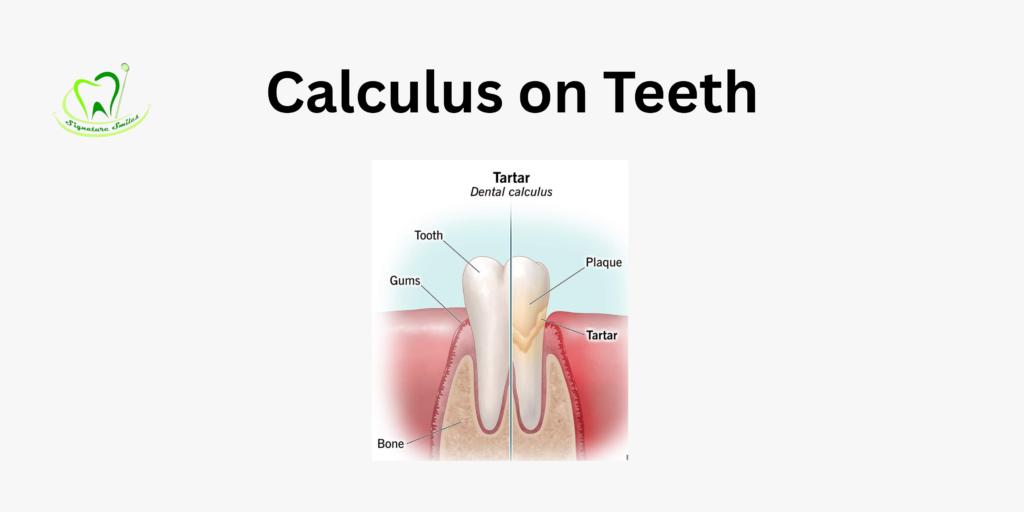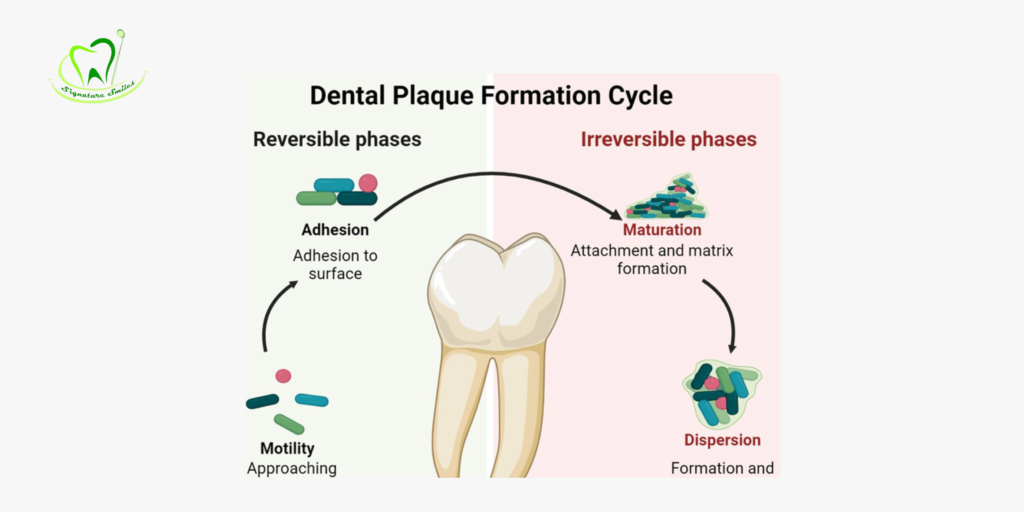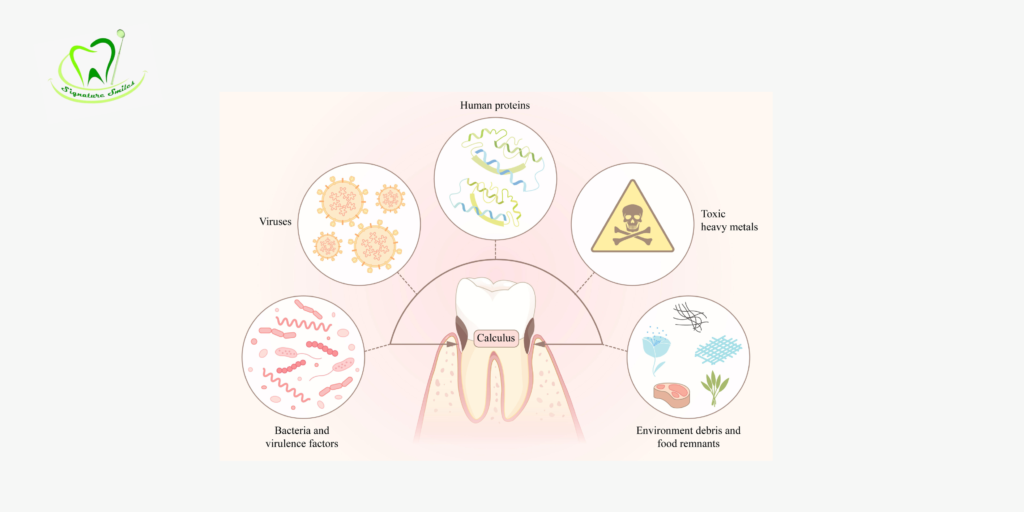Discover what causes dental calculus (tartar), how to remove it safely, and proven preventive measures to protect your oral health. Learn expert tips for a cleaner, healthier smile.
Introduction: Understanding Calculus on Teeth and Its Implications for Oral Health
A deadened form of dental plaque that accumulates on teeth and beneath the gum line is called tartar or dental calculus. It forms when plaque—a sticky biofilm of bacteria, saliva, and food particles—is not adequately removed through brushing and flossing. Over time, the minerals in saliva cause the plaque to calcify, forming calculus. In addition to detracting from teeth’s aesthetics, this mineralized deposit poses serious dangers to oral health by raising the possibility of cavities, gum disease, and tooth loss. Maintaining a healthy smile requires understanding the origins and effects of calculus accumulation.

The Formation of Dental Calculus: Causes and Contributing Factors
Calculus forms when dental plaque remains on tooth surfaces for an extended period. Several factors influence the rate and severity of calculus formation:
- Inadequate oral hygiene: Skipping, brushing, or flossing allows plaque to build up and harden.
- A diet high in sugar and starches: Sugary and starchy foods feed plaque-producing bacteria, accelerating calculus development.
- Low saliva flow or dry mouth: Saliva aids in washing away scraps and restraining the acid; reduced flow creates a favorable environment for plaque retention.
- Smoking and tobacco use: Nicotine reduces saliva production and alters the bacterial composition in the mouth, increasing tartar risk.
- Poor dental alignment: Crooked or misaligned teeth make it harder to remove plaque effectively.
- Age and hormonal changes: Older adults and individuals undergoing hormonal shifts (e.g., pregnancy) may experience increased calculus buildup.
Once formed, calculus can only be removed by professional cleaning, emphasizing the importance of daily oral care and regular dental visits.
Symptoms and Signs: How to Recognize Calculus on Teeth
Calculus often begins as a rough, chalky deposit that adheres to the enamel near the gumline. Staining from food, drinks, or tobacco causes it to become more prominent and discolored over time. Common signs include:
- Yellow or brown deposits on the surface of teeth, especially between the teeth and along the gums.
- Persistent bad breath (halitosis) resulting from bacterial activity within the tartar.
- Receding gums or inflammation, leading to tenderness or bleeding during brushing.
- Tooth sensitivity due to exposed dentin when the gums pull away.
- Loose teeth in severe cases where calculus has contributed to gum and bone loss.
If you have any of these symptoms, it’s essential to have your teeth examined and treated by a dentist before the condition worsens.

The Impact of Calculus on Oral Health: Risks and Complications
Unchecked calculus buildup can lead to serious oral health issues:
- Gingivitis: The early stages of gum disease are associated with red, swollen gums that bleed easily, which is known as gingivitis.
- Periodontitis: Chronic inflammation is the cause of advanced gum disease, which results in chronic inflammation in advanced gum disease that destroys the teeth’s supporting structures, including bone.
- Tooth decay: Tartar provides a rough surface where bacteria thrive, increasing the risk of cavities.
- Tooth loss: Continued damage to the periodontal ligament and alveolar bone can eventually result in tooth loss.
- Systemic health complications: Studies link periodontal disease to systemic conditions such as heart disease, diabetes, and respiratory infections.
Maintaining good oral hygiene and regular professional cleanings are essential to prevent these potentially irreversible consequences.
Effective Methods for Removal of Dental Calculus: Professional vs. At-Home Solutions
Once calculus forms, it cannot be removed by brushing or flossing alone. Two main approaches to removal include:
Professional Dental Cleaning
- Scaling: Dentists use ultrasonic scalers and hand instruments to dislodge calculus from teeth and below the gumline.
- Root planing: The root surfaces are smoothed for advanced cases to discourage further bacterial accumulation.
- Polishing: Final polishing removes surface stains and smooths enamel, making it harder for plaque to adhere.
At-Home Dental Care Tools (Supportive, Not Curative)
- Tartar control toothpaste: Formulated with pyrophosphates or zinc citrate to inhibit plaque mineralization.
- Electric toothbrushes: They offer better plaque removal compared to manual brushing.
- Water flossers: Help clean hard-to-reach areas and reduce plaque levels.
⚠️ At-home scraping tools are not recommended, as improper use can damage enamel and gums. Always consult a dental professional for calculus removal.

Prevention Tips to Minimize the Risk of Calculus Buildup
Preventing dental calculus requires a proactive, daily approach to oral hygiene. Here are proven tips to minimize tartar formation:
- Use fluoride toothpaste and a soft-bristled or electric toothbrush to brush your teeth twice daily.
- Floss at least once a day to remove plaque between teeth.
- Use an antimicrobial mouthwash to reduce bacterial load.
- Limit sugary and acidic foods and drinks, which promote bacterial activity.
- Stay hydrated to support healthy saliva flow.
- Quit smoking to reduce tartar risk and improve overall oral health.
- Your dentist should be visited every 6 months for routine exams and professional cleanings.
When consistently followed, these steps form the foundation of a calculus-free mouth.
Prioritizing Oral Health and Preventing Calculus
Overall well-being is intrinsically linked to oral health. Taking a preventative approach to dental care enhances our systemic health. Knowing how and why calculus forms can help us make informed decisions that will preserve our teeth and gums for a lifetime. Prevention is always more effective—and less costly—than treatment.
Maintaining Optimal Oral Health to Prevent Calculus
Achieving optimal oral health requires consistency and mindfulness:
- Adopt a routine that includes brushing, flossing, and rinsing.
- Schedule regular dental visits even if there are no apparent issues.
- Eat a balanced fiber, calcium, and vitamins to strengthen teeth and support gum health.
- Avoid frequent snacking, especially on sugary treats that feed plaque-causing bacteria.
- Be aware of changes in your oral health, such as gum bleeding or bad breath, and act promptly.
This holistic approach ensures long-term protection against calculus and other dental problems.
Frequently Asked Questions About Dental Calculus
1. Can calculus be removed at home?
No, once calculus has formed, it is too hard to remove with a toothbrush or floss. Only a dental professional can safely and effectively remove tartar using specialized tools.
2. How quickly can tartar form on teeth?
If plaque is not properly removed, tar can form within 24 to 72 hours. Once it mineralizes, it becomes stubborn and requires professional intervention.
3. Does tartar cause cavities?
Yes, tartar creates an ideal environment for bacteria, which produce acids that demineralize enamel, leading to cavities and other dental problems.
4. Is tartar the same as plaque?
Daily brushing can remove plaque, a soft, sticky film. Tartar is hardened plaque that has calcified and bonded to the tooth surface, requiring professional removal.
5. Can children develop dental calculus?
Yes, children can develop tartar, especially with poor oral hygiene habits. Teaching children proper brushing and flossing techniques early makes preventing buildup easier.
Conclusion:
Calculus on teeth is a preventable condition that poses real risks to oral and overall health. Keeping a healthy, vibrant smile is possible by comprehending its causes, recognizing its symptoms, investing in professional care, and daily prevention. Tartar is not just a cosmetic issue—it can also be a pathway to more serious problems. Routine care is key to achieving a clean, calculus-free mouth.